Public Health Strategies for Disease Control in England: A Report
VerifiedAdded on 2020/10/04
|11
|4368
|172
Report
AI Summary
This report provides an overview of the role of public health in England, focusing on the identification of disease levels by health agencies such as the WHO and Public Health England, and the epidemiology of HIV/AIDS and Type II diabetes. It examines the effectiveness of various approaches and strategies employed to control both infectious and non-infectious diseases, including new vaccine development, improved diagnostics, and awareness campaigns. The report further explores current priorities and approaches in the provision of health services, such as prevention, treatment, and palliative care, and analyzes the relationship between disease prevalence and the requirements of health services, emphasizing the need for proper planning, facilities, expertise, and funding. The analysis highlights the importance of health agencies in managing and mitigating the impact of these diseases on the population of England.
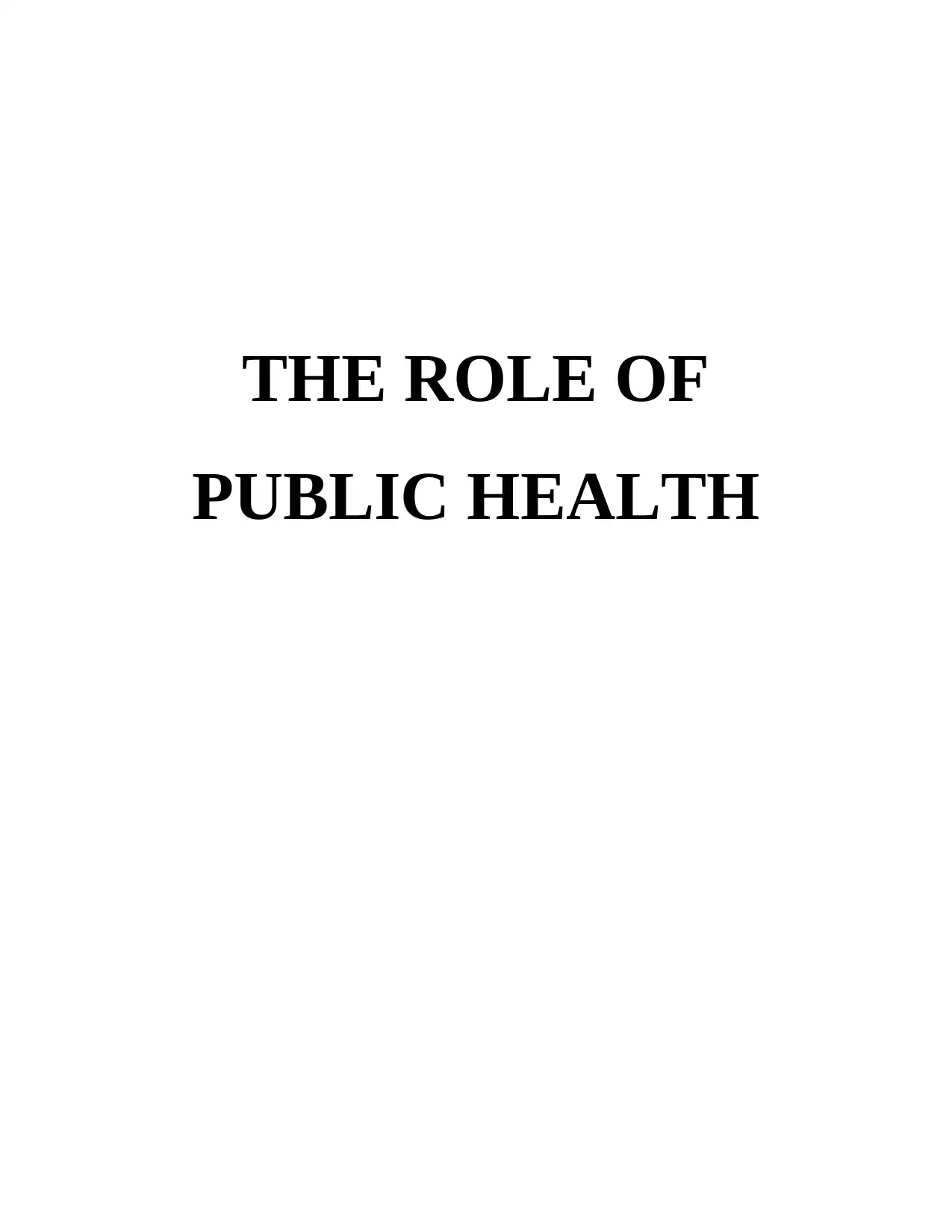
THE ROLE OF
PUBLIC HEALTH
PUBLIC HEALTH
Paraphrase This Document
Need a fresh take? Get an instant paraphrase of this document with our AI Paraphraser
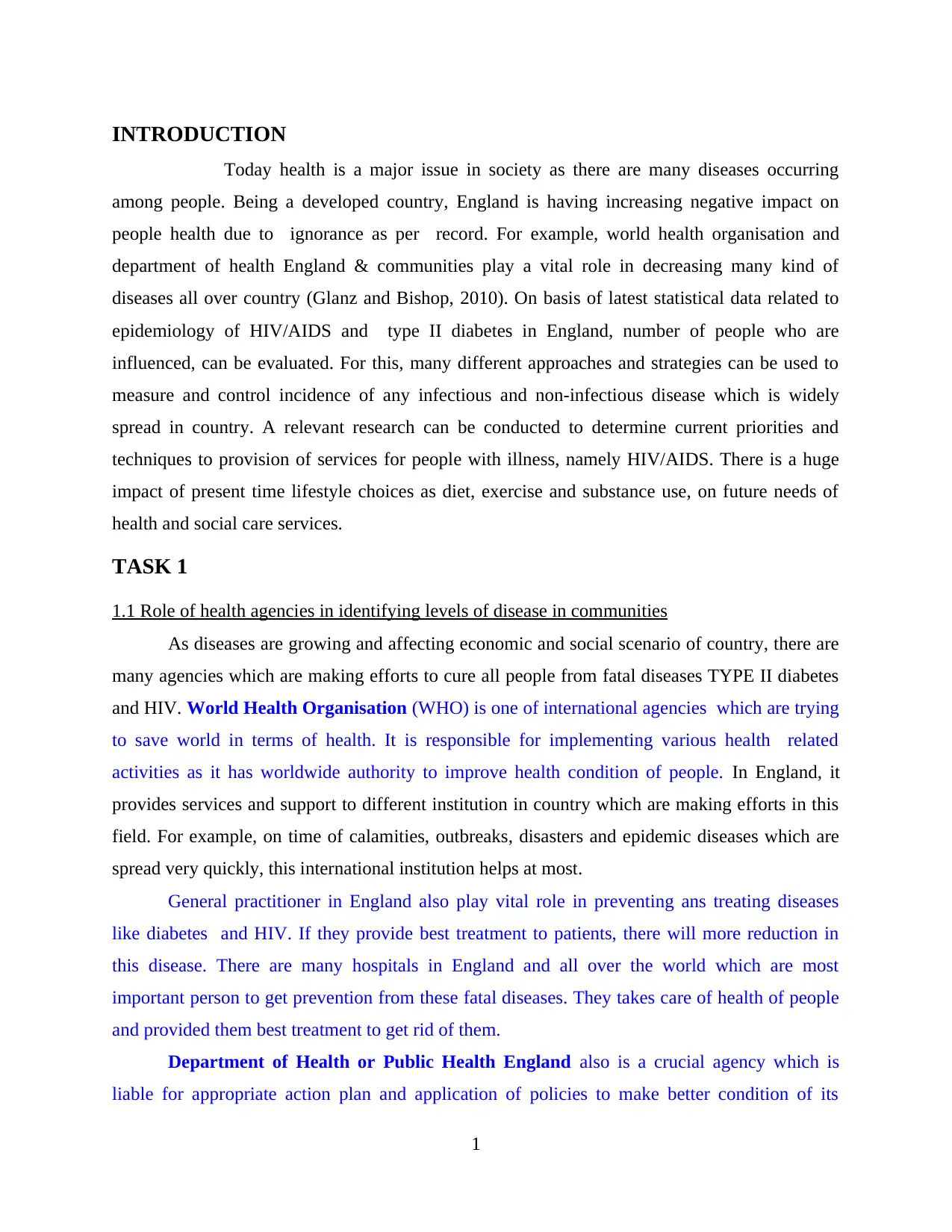
INTRODUCTION
Today health is a major issue in society as there are many diseases occurring
among people. Being a developed country, England is having increasing negative impact on
people health due to ignorance as per record. For example, world health organisation and
department of health England & communities play a vital role in decreasing many kind of
diseases all over country (Glanz and Bishop, 2010). On basis of latest statistical data related to
epidemiology of HIV/AIDS and type II diabetes in England, number of people who are
influenced, can be evaluated. For this, many different approaches and strategies can be used to
measure and control incidence of any infectious and non-infectious disease which is widely
spread in country. A relevant research can be conducted to determine current priorities and
techniques to provision of services for people with illness, namely HIV/AIDS. There is a huge
impact of present time lifestyle choices as diet, exercise and substance use, on future needs of
health and social care services.
TASK 1
1.1 Role of health agencies in identifying levels of disease in communities
As diseases are growing and affecting economic and social scenario of country, there are
many agencies which are making efforts to cure all people from fatal diseases TYPE II diabetes
and HIV. World Health Organisation (WHO) is one of international agencies which are trying
to save world in terms of health. It is responsible for implementing various health related
activities as it has worldwide authority to improve health condition of people. In England, it
provides services and support to different institution in country which are making efforts in this
field. For example, on time of calamities, outbreaks, disasters and epidemic diseases which are
spread very quickly, this international institution helps at most.
General practitioner in England also play vital role in preventing ans treating diseases
like diabetes and HIV. If they provide best treatment to patients, there will more reduction in
this disease. There are many hospitals in England and all over the world which are most
important person to get prevention from these fatal diseases. They takes care of health of people
and provided them best treatment to get rid of them.
Department of Health or Public Health England also is a crucial agency which is
liable for appropriate action plan and application of policies to make better condition of its
1
Today health is a major issue in society as there are many diseases occurring
among people. Being a developed country, England is having increasing negative impact on
people health due to ignorance as per record. For example, world health organisation and
department of health England & communities play a vital role in decreasing many kind of
diseases all over country (Glanz and Bishop, 2010). On basis of latest statistical data related to
epidemiology of HIV/AIDS and type II diabetes in England, number of people who are
influenced, can be evaluated. For this, many different approaches and strategies can be used to
measure and control incidence of any infectious and non-infectious disease which is widely
spread in country. A relevant research can be conducted to determine current priorities and
techniques to provision of services for people with illness, namely HIV/AIDS. There is a huge
impact of present time lifestyle choices as diet, exercise and substance use, on future needs of
health and social care services.
TASK 1
1.1 Role of health agencies in identifying levels of disease in communities
As diseases are growing and affecting economic and social scenario of country, there are
many agencies which are making efforts to cure all people from fatal diseases TYPE II diabetes
and HIV. World Health Organisation (WHO) is one of international agencies which are trying
to save world in terms of health. It is responsible for implementing various health related
activities as it has worldwide authority to improve health condition of people. In England, it
provides services and support to different institution in country which are making efforts in this
field. For example, on time of calamities, outbreaks, disasters and epidemic diseases which are
spread very quickly, this international institution helps at most.
General practitioner in England also play vital role in preventing ans treating diseases
like diabetes and HIV. If they provide best treatment to patients, there will more reduction in
this disease. There are many hospitals in England and all over the world which are most
important person to get prevention from these fatal diseases. They takes care of health of people
and provided them best treatment to get rid of them.
Department of Health or Public Health England also is a crucial agency which is
liable for appropriate action plan and application of policies to make better condition of its
1
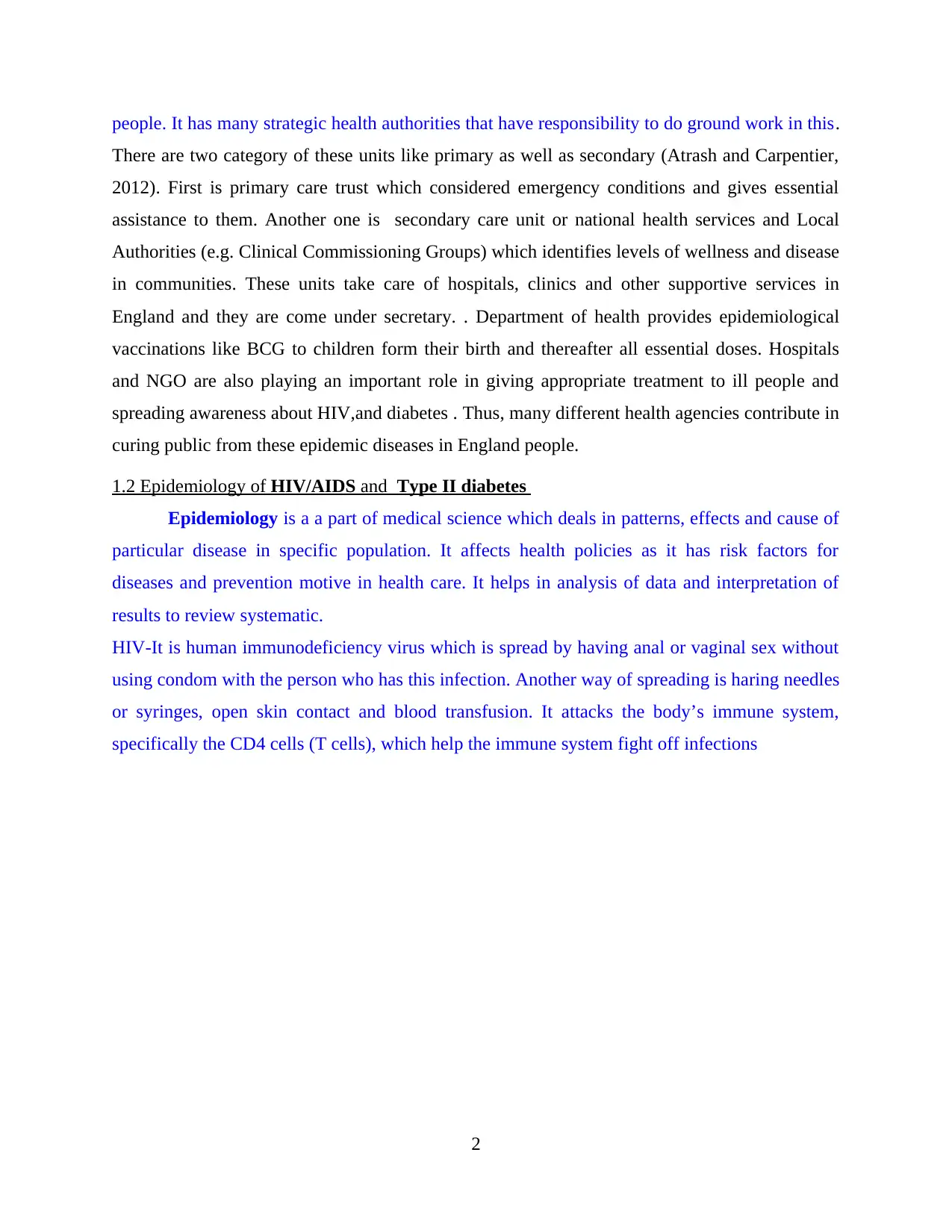
people. It has many strategic health authorities that have responsibility to do ground work in this.
There are two category of these units like primary as well as secondary (Atrash and Carpentier,
2012). First is primary care trust which considered emergency conditions and gives essential
assistance to them. Another one is secondary care unit or national health services and Local
Authorities (e.g. Clinical Commissioning Groups) which identifies levels of wellness and disease
in communities. These units take care of hospitals, clinics and other supportive services in
England and they are come under secretary. . Department of health provides epidemiological
vaccinations like BCG to children form their birth and thereafter all essential doses. Hospitals
and NGO are also playing an important role in giving appropriate treatment to ill people and
spreading awareness about HIV,and diabetes . Thus, many different health agencies contribute in
curing public from these epidemic diseases in England people.
1.2 Epidemiology of HIV/AIDS and Type II diabetes
Epidemiology is a a part of medical science which deals in patterns, effects and cause of
particular disease in specific population. It affects health policies as it has risk factors for
diseases and prevention motive in health care. It helps in analysis of data and interpretation of
results to review systematic.
HIV-It is human immunodeficiency virus which is spread by having anal or vaginal sex without
using condom with the person who has this infection. Another way of spreading is haring needles
or syringes, open skin contact and blood transfusion. It attacks the body’s immune system,
specifically the CD4 cells (T cells), which help the immune system fight off infections
2
There are two category of these units like primary as well as secondary (Atrash and Carpentier,
2012). First is primary care trust which considered emergency conditions and gives essential
assistance to them. Another one is secondary care unit or national health services and Local
Authorities (e.g. Clinical Commissioning Groups) which identifies levels of wellness and disease
in communities. These units take care of hospitals, clinics and other supportive services in
England and they are come under secretary. . Department of health provides epidemiological
vaccinations like BCG to children form their birth and thereafter all essential doses. Hospitals
and NGO are also playing an important role in giving appropriate treatment to ill people and
spreading awareness about HIV,and diabetes . Thus, many different health agencies contribute in
curing public from these epidemic diseases in England people.
1.2 Epidemiology of HIV/AIDS and Type II diabetes
Epidemiology is a a part of medical science which deals in patterns, effects and cause of
particular disease in specific population. It affects health policies as it has risk factors for
diseases and prevention motive in health care. It helps in analysis of data and interpretation of
results to review systematic.
HIV-It is human immunodeficiency virus which is spread by having anal or vaginal sex without
using condom with the person who has this infection. Another way of spreading is haring needles
or syringes, open skin contact and blood transfusion. It attacks the body’s immune system,
specifically the CD4 cells (T cells), which help the immune system fight off infections
2
⊘ This is a preview!⊘
Do you want full access?
Subscribe today to unlock all pages.

Trusted by 1+ million students worldwide
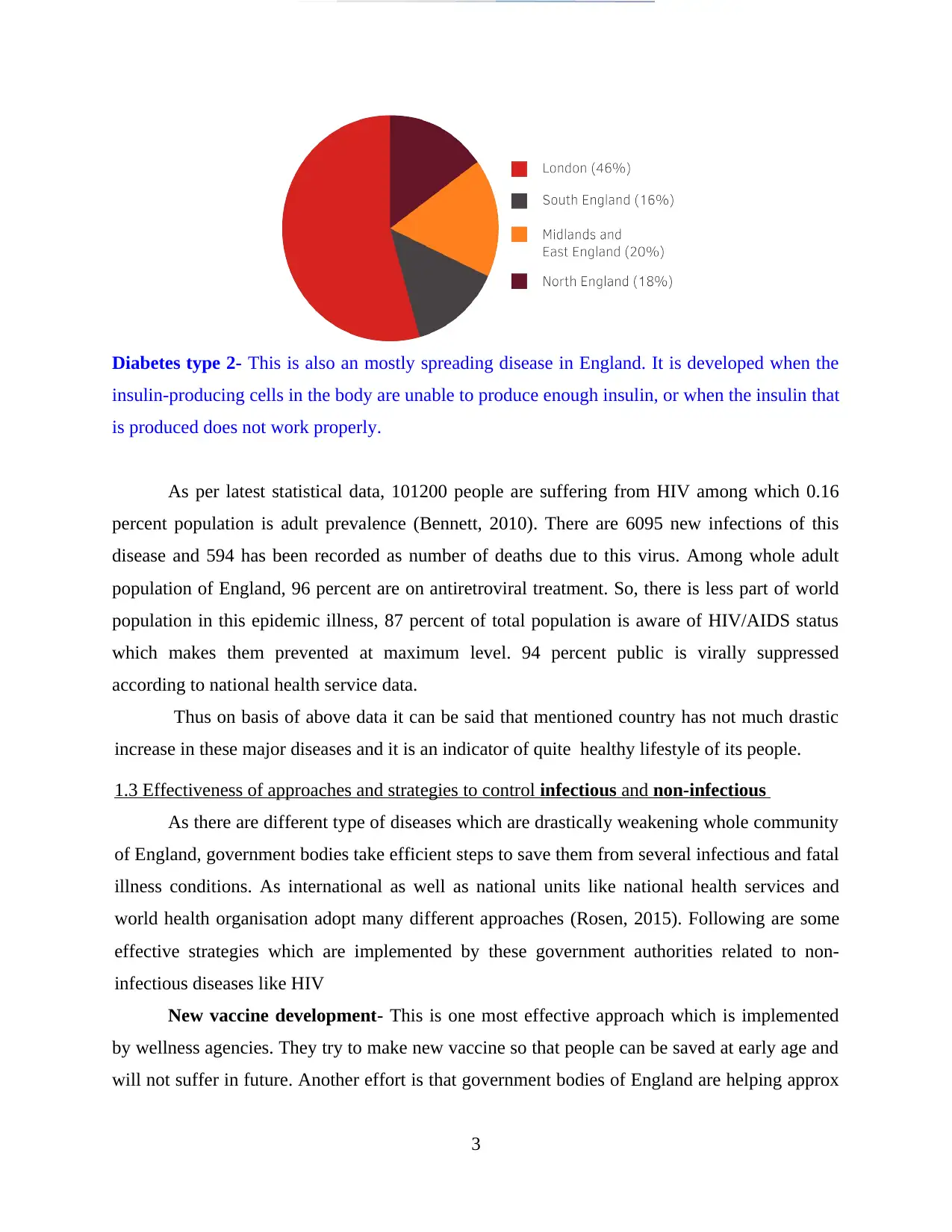
Diabetes type 2- This is also an mostly spreading disease in England. It is developed when the
insulin-producing cells in the body are unable to produce enough insulin, or when the insulin that
is produced does not work properly.
As per latest statistical data, 101200 people are suffering from HIV among which 0.16
percent population is adult prevalence (Bennett, 2010). There are 6095 new infections of this
disease and 594 has been recorded as number of deaths due to this virus. Among whole adult
population of England, 96 percent are on antiretroviral treatment. So, there is less part of world
population in this epidemic illness, 87 percent of total population is aware of HIV/AIDS status
which makes them prevented at maximum level. 94 percent public is virally suppressed
according to national health service data.
Thus on basis of above data it can be said that mentioned country has not much drastic
increase in these major diseases and it is an indicator of quite healthy lifestyle of its people.
1.3 Effectiveness of approaches and strategies to control infectious and non-infectious
As there are different type of diseases which are drastically weakening whole community
of England, government bodies take efficient steps to save them from several infectious and fatal
illness conditions. As international as well as national units like national health services and
world health organisation adopt many different approaches (Rosen, 2015). Following are some
effective strategies which are implemented by these government authorities related to non-
infectious diseases like HIV
New vaccine development- This is one most effective approach which is implemented
by wellness agencies. They try to make new vaccine so that people can be saved at early age and
will not suffer in future. Another effort is that government bodies of England are helping approx
3
insulin-producing cells in the body are unable to produce enough insulin, or when the insulin that
is produced does not work properly.
As per latest statistical data, 101200 people are suffering from HIV among which 0.16
percent population is adult prevalence (Bennett, 2010). There are 6095 new infections of this
disease and 594 has been recorded as number of deaths due to this virus. Among whole adult
population of England, 96 percent are on antiretroviral treatment. So, there is less part of world
population in this epidemic illness, 87 percent of total population is aware of HIV/AIDS status
which makes them prevented at maximum level. 94 percent public is virally suppressed
according to national health service data.
Thus on basis of above data it can be said that mentioned country has not much drastic
increase in these major diseases and it is an indicator of quite healthy lifestyle of its people.
1.3 Effectiveness of approaches and strategies to control infectious and non-infectious
As there are different type of diseases which are drastically weakening whole community
of England, government bodies take efficient steps to save them from several infectious and fatal
illness conditions. As international as well as national units like national health services and
world health organisation adopt many different approaches (Rosen, 2015). Following are some
effective strategies which are implemented by these government authorities related to non-
infectious diseases like HIV
New vaccine development- This is one most effective approach which is implemented
by wellness agencies. They try to make new vaccine so that people can be saved at early age and
will not suffer in future. Another effort is that government bodies of England are helping approx
3
Paraphrase This Document
Need a fresh take? Get an instant paraphrase of this document with our AI Paraphraser
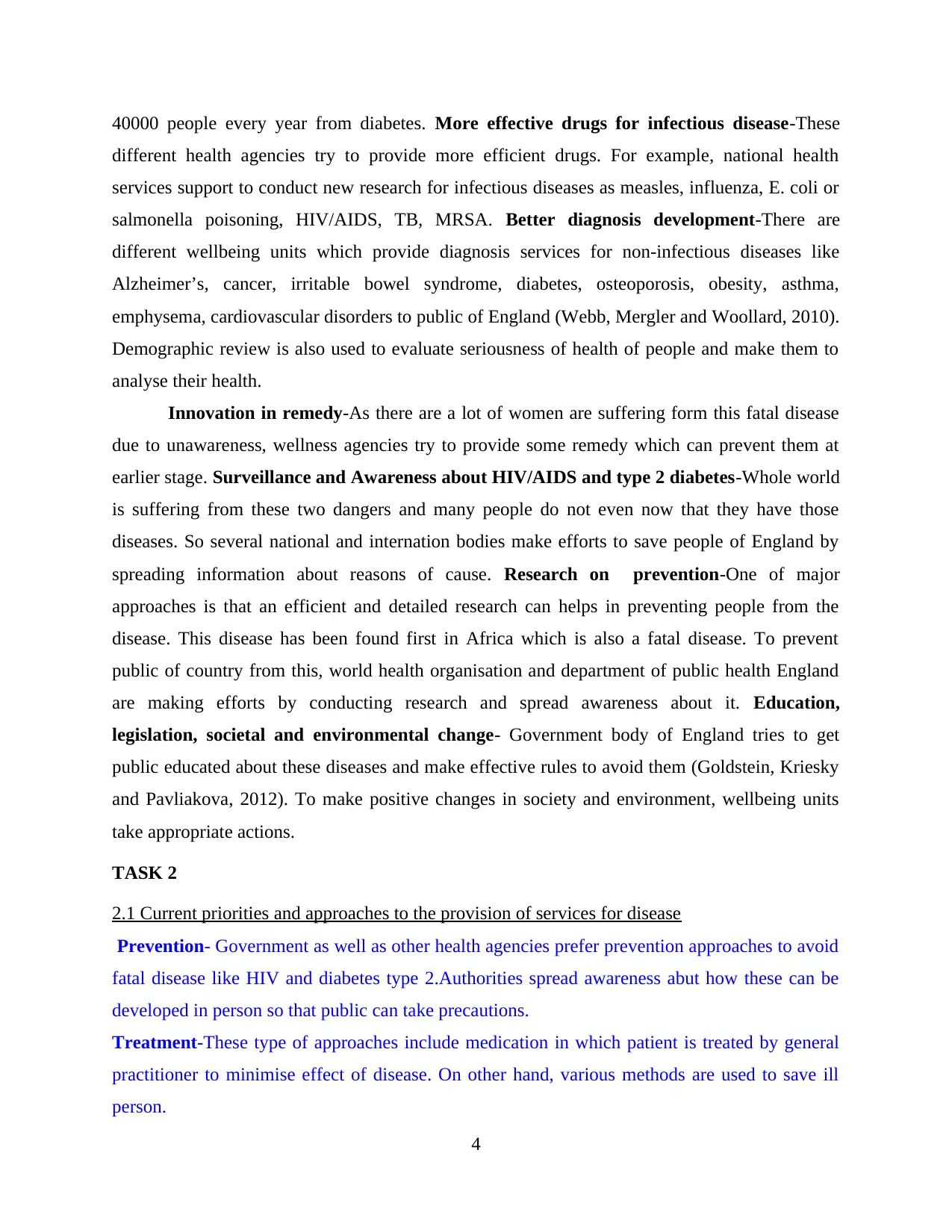
40000 people every year from diabetes. More effective drugs for infectious disease-These
different health agencies try to provide more efficient drugs. For example, national health
services support to conduct new research for infectious diseases as measles, influenza, E. coli or
salmonella poisoning, HIV/AIDS, TB, MRSA. Better diagnosis development-There are
different wellbeing units which provide diagnosis services for non-infectious diseases like
Alzheimer’s, cancer, irritable bowel syndrome, diabetes, osteoporosis, obesity, asthma,
emphysema, cardiovascular disorders to public of England (Webb, Mergler and Woollard, 2010).
Demographic review is also used to evaluate seriousness of health of people and make them to
analyse their health.
Innovation in remedy-As there are a lot of women are suffering form this fatal disease
due to unawareness, wellness agencies try to provide some remedy which can prevent them at
earlier stage. Surveillance and Awareness about HIV/AIDS and type 2 diabetes-Whole world
is suffering from these two dangers and many people do not even now that they have those
diseases. So several national and internation bodies make efforts to save people of England by
spreading information about reasons of cause. Research on prevention-One of major
approaches is that an efficient and detailed research can helps in preventing people from the
disease. This disease has been found first in Africa which is also a fatal disease. To prevent
public of country from this, world health organisation and department of public health England
are making efforts by conducting research and spread awareness about it. Education,
legislation, societal and environmental change- Government body of England tries to get
public educated about these diseases and make effective rules to avoid them (Goldstein, Kriesky
and Pavliakova, 2012). To make positive changes in society and environment, wellbeing units
take appropriate actions.
TASK 2
2.1 Current priorities and approaches to the provision of services for disease
Prevention- Government as well as other health agencies prefer prevention approaches to avoid
fatal disease like HIV and diabetes type 2.Authorities spread awareness abut how these can be
developed in person so that public can take precautions.
Treatment-These type of approaches include medication in which patient is treated by general
practitioner to minimise effect of disease. On other hand, various methods are used to save ill
person.
4
different health agencies try to provide more efficient drugs. For example, national health
services support to conduct new research for infectious diseases as measles, influenza, E. coli or
salmonella poisoning, HIV/AIDS, TB, MRSA. Better diagnosis development-There are
different wellbeing units which provide diagnosis services for non-infectious diseases like
Alzheimer’s, cancer, irritable bowel syndrome, diabetes, osteoporosis, obesity, asthma,
emphysema, cardiovascular disorders to public of England (Webb, Mergler and Woollard, 2010).
Demographic review is also used to evaluate seriousness of health of people and make them to
analyse their health.
Innovation in remedy-As there are a lot of women are suffering form this fatal disease
due to unawareness, wellness agencies try to provide some remedy which can prevent them at
earlier stage. Surveillance and Awareness about HIV/AIDS and type 2 diabetes-Whole world
is suffering from these two dangers and many people do not even now that they have those
diseases. So several national and internation bodies make efforts to save people of England by
spreading information about reasons of cause. Research on prevention-One of major
approaches is that an efficient and detailed research can helps in preventing people from the
disease. This disease has been found first in Africa which is also a fatal disease. To prevent
public of country from this, world health organisation and department of public health England
are making efforts by conducting research and spread awareness about it. Education,
legislation, societal and environmental change- Government body of England tries to get
public educated about these diseases and make effective rules to avoid them (Goldstein, Kriesky
and Pavliakova, 2012). To make positive changes in society and environment, wellbeing units
take appropriate actions.
TASK 2
2.1 Current priorities and approaches to the provision of services for disease
Prevention- Government as well as other health agencies prefer prevention approaches to avoid
fatal disease like HIV and diabetes type 2.Authorities spread awareness abut how these can be
developed in person so that public can take precautions.
Treatment-These type of approaches include medication in which patient is treated by general
practitioner to minimise effect of disease. On other hand, various methods are used to save ill
person.
4
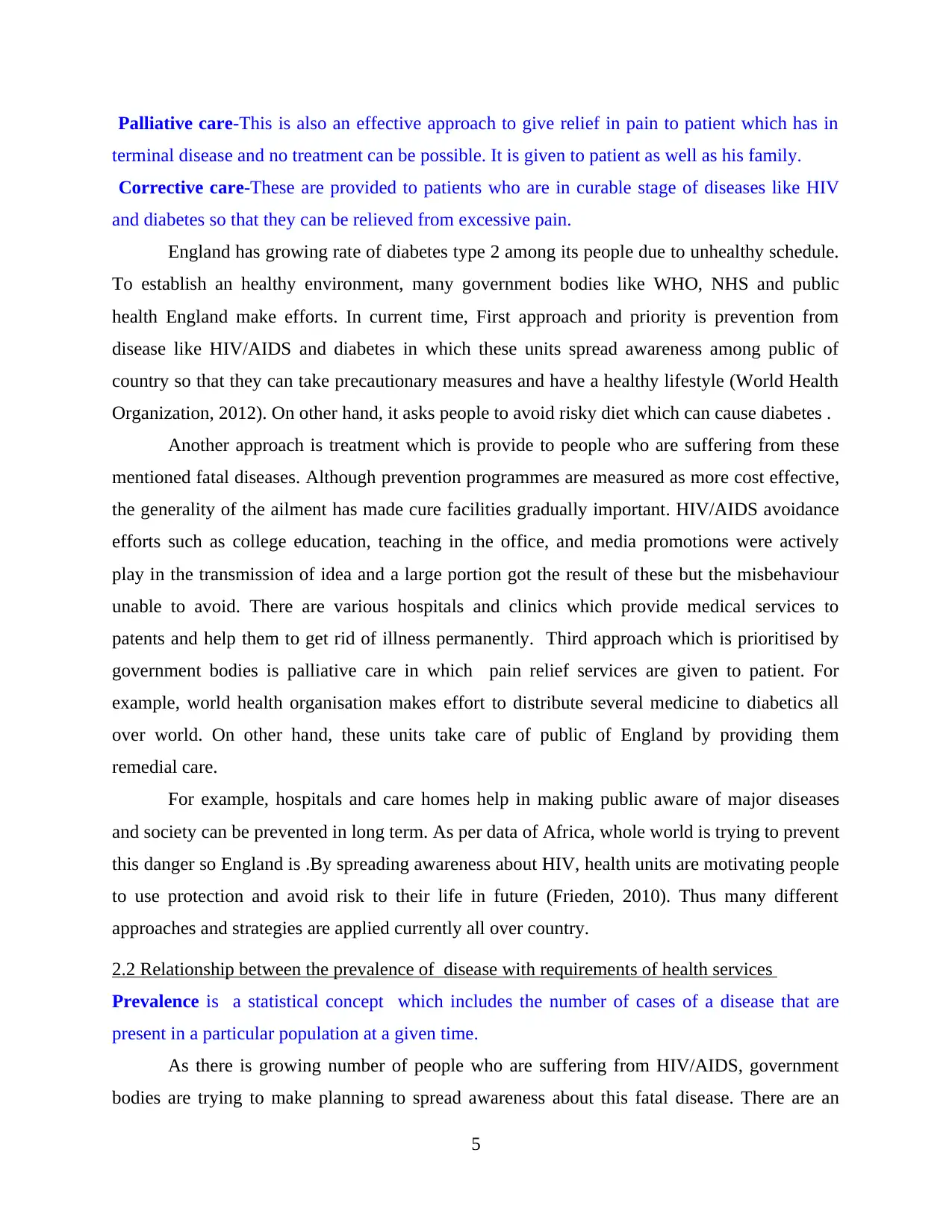
Palliative care-This is also an effective approach to give relief in pain to patient which has in
terminal disease and no treatment can be possible. It is given to patient as well as his family.
Corrective care-These are provided to patients who are in curable stage of diseases like HIV
and diabetes so that they can be relieved from excessive pain.
England has growing rate of diabetes type 2 among its people due to unhealthy schedule.
To establish an healthy environment, many government bodies like WHO, NHS and public
health England make efforts. In current time, First approach and priority is prevention from
disease like HIV/AIDS and diabetes in which these units spread awareness among public of
country so that they can take precautionary measures and have a healthy lifestyle (World Health
Organization, 2012). On other hand, it asks people to avoid risky diet which can cause diabetes .
Another approach is treatment which is provide to people who are suffering from these
mentioned fatal diseases. Although prevention programmes are measured as more cost effective,
the generality of the ailment has made cure facilities gradually important. HIV/AIDS avoidance
efforts such as college education, teaching in the office, and media promotions were actively
play in the transmission of idea and a large portion got the result of these but the misbehaviour
unable to avoid. There are various hospitals and clinics which provide medical services to
patents and help them to get rid of illness permanently. Third approach which is prioritised by
government bodies is palliative care in which pain relief services are given to patient. For
example, world health organisation makes effort to distribute several medicine to diabetics all
over world. On other hand, these units take care of public of England by providing them
remedial care.
For example, hospitals and care homes help in making public aware of major diseases
and society can be prevented in long term. As per data of Africa, whole world is trying to prevent
this danger so England is .By spreading awareness about HIV, health units are motivating people
to use protection and avoid risk to their life in future (Frieden, 2010). Thus many different
approaches and strategies are applied currently all over country.
2.2 Relationship between the prevalence of disease with requirements of health services
Prevalence is a statistical concept which includes the number of cases of a disease that are
present in a particular population at a given time.
As there is growing number of people who are suffering from HIV/AIDS, government
bodies are trying to make planning to spread awareness about this fatal disease. There are an
5
terminal disease and no treatment can be possible. It is given to patient as well as his family.
Corrective care-These are provided to patients who are in curable stage of diseases like HIV
and diabetes so that they can be relieved from excessive pain.
England has growing rate of diabetes type 2 among its people due to unhealthy schedule.
To establish an healthy environment, many government bodies like WHO, NHS and public
health England make efforts. In current time, First approach and priority is prevention from
disease like HIV/AIDS and diabetes in which these units spread awareness among public of
country so that they can take precautionary measures and have a healthy lifestyle (World Health
Organization, 2012). On other hand, it asks people to avoid risky diet which can cause diabetes .
Another approach is treatment which is provide to people who are suffering from these
mentioned fatal diseases. Although prevention programmes are measured as more cost effective,
the generality of the ailment has made cure facilities gradually important. HIV/AIDS avoidance
efforts such as college education, teaching in the office, and media promotions were actively
play in the transmission of idea and a large portion got the result of these but the misbehaviour
unable to avoid. There are various hospitals and clinics which provide medical services to
patents and help them to get rid of illness permanently. Third approach which is prioritised by
government bodies is palliative care in which pain relief services are given to patient. For
example, world health organisation makes effort to distribute several medicine to diabetics all
over world. On other hand, these units take care of public of England by providing them
remedial care.
For example, hospitals and care homes help in making public aware of major diseases
and society can be prevented in long term. As per data of Africa, whole world is trying to prevent
this danger so England is .By spreading awareness about HIV, health units are motivating people
to use protection and avoid risk to their life in future (Frieden, 2010). Thus many different
approaches and strategies are applied currently all over country.
2.2 Relationship between the prevalence of disease with requirements of health services
Prevalence is a statistical concept which includes the number of cases of a disease that are
present in a particular population at a given time.
As there is growing number of people who are suffering from HIV/AIDS, government
bodies are trying to make planning to spread awareness about this fatal disease. There are an
5
⊘ This is a preview!⊘
Do you want full access?
Subscribe today to unlock all pages.

Trusted by 1+ million students worldwide
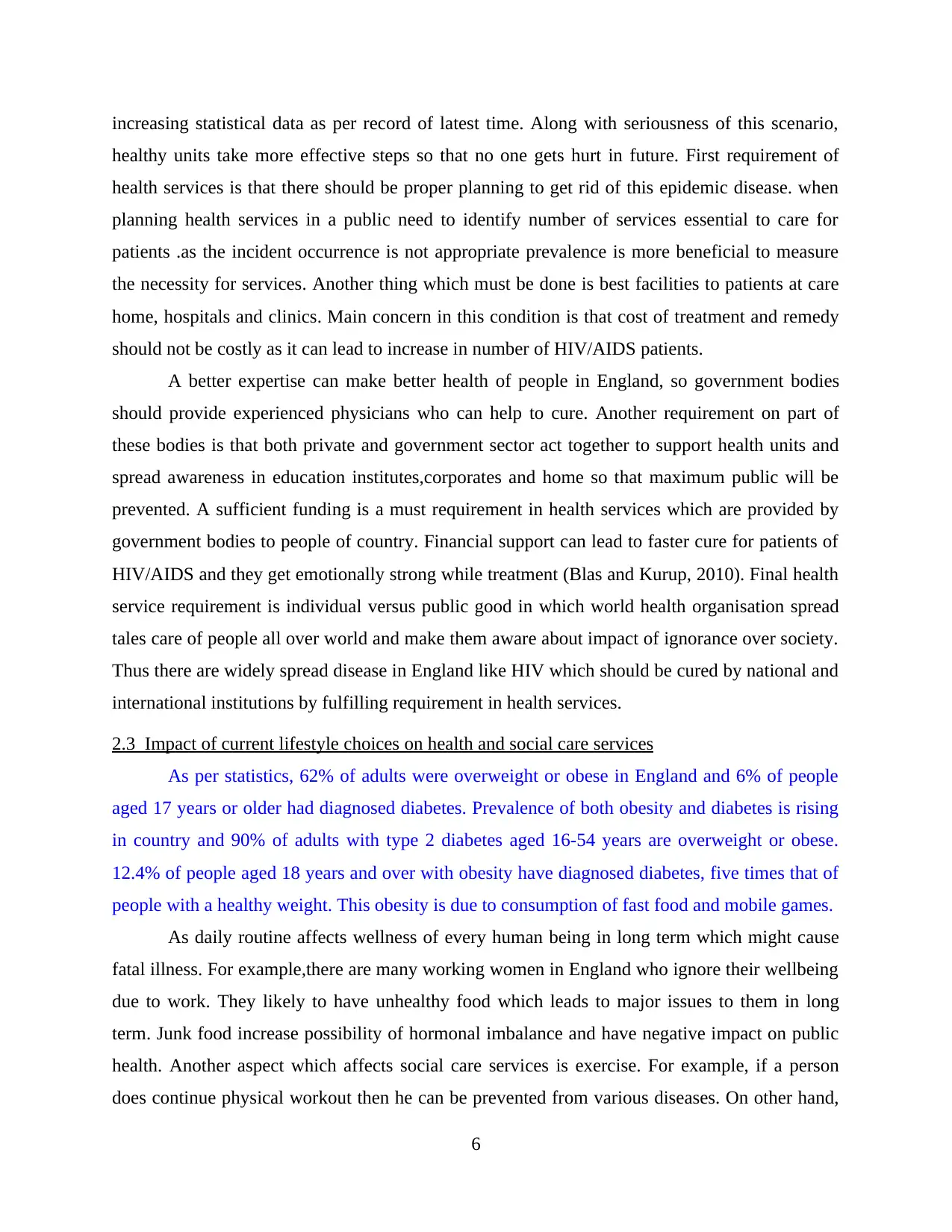
increasing statistical data as per record of latest time. Along with seriousness of this scenario,
healthy units take more effective steps so that no one gets hurt in future. First requirement of
health services is that there should be proper planning to get rid of this epidemic disease. when
planning health services in a public need to identify number of services essential to care for
patients .as the incident occurrence is not appropriate prevalence is more beneficial to measure
the necessity for services. Another thing which must be done is best facilities to patients at care
home, hospitals and clinics. Main concern in this condition is that cost of treatment and remedy
should not be costly as it can lead to increase in number of HIV/AIDS patients.
A better expertise can make better health of people in England, so government bodies
should provide experienced physicians who can help to cure. Another requirement on part of
these bodies is that both private and government sector act together to support health units and
spread awareness in education institutes,corporates and home so that maximum public will be
prevented. A sufficient funding is a must requirement in health services which are provided by
government bodies to people of country. Financial support can lead to faster cure for patients of
HIV/AIDS and they get emotionally strong while treatment (Blas and Kurup, 2010). Final health
service requirement is individual versus public good in which world health organisation spread
tales care of people all over world and make them aware about impact of ignorance over society.
Thus there are widely spread disease in England like HIV which should be cured by national and
international institutions by fulfilling requirement in health services.
2.3 Impact of current lifestyle choices on health and social care services
As per statistics, 62% of adults were overweight or obese in England and 6% of people
aged 17 years or older had diagnosed diabetes. Prevalence of both obesity and diabetes is rising
in country and 90% of adults with type 2 diabetes aged 16-54 years are overweight or obese.
12.4% of people aged 18 years and over with obesity have diagnosed diabetes, five times that of
people with a healthy weight. This obesity is due to consumption of fast food and mobile games.
As daily routine affects wellness of every human being in long term which might cause
fatal illness. For example,there are many working women in England who ignore their wellbeing
due to work. They likely to have unhealthy food which leads to major issues to them in long
term. Junk food increase possibility of hormonal imbalance and have negative impact on public
health. Another aspect which affects social care services is exercise. For example, if a person
does continue physical workout then he can be prevented from various diseases. On other hand,
6
healthy units take more effective steps so that no one gets hurt in future. First requirement of
health services is that there should be proper planning to get rid of this epidemic disease. when
planning health services in a public need to identify number of services essential to care for
patients .as the incident occurrence is not appropriate prevalence is more beneficial to measure
the necessity for services. Another thing which must be done is best facilities to patients at care
home, hospitals and clinics. Main concern in this condition is that cost of treatment and remedy
should not be costly as it can lead to increase in number of HIV/AIDS patients.
A better expertise can make better health of people in England, so government bodies
should provide experienced physicians who can help to cure. Another requirement on part of
these bodies is that both private and government sector act together to support health units and
spread awareness in education institutes,corporates and home so that maximum public will be
prevented. A sufficient funding is a must requirement in health services which are provided by
government bodies to people of country. Financial support can lead to faster cure for patients of
HIV/AIDS and they get emotionally strong while treatment (Blas and Kurup, 2010). Final health
service requirement is individual versus public good in which world health organisation spread
tales care of people all over world and make them aware about impact of ignorance over society.
Thus there are widely spread disease in England like HIV which should be cured by national and
international institutions by fulfilling requirement in health services.
2.3 Impact of current lifestyle choices on health and social care services
As per statistics, 62% of adults were overweight or obese in England and 6% of people
aged 17 years or older had diagnosed diabetes. Prevalence of both obesity and diabetes is rising
in country and 90% of adults with type 2 diabetes aged 16-54 years are overweight or obese.
12.4% of people aged 18 years and over with obesity have diagnosed diabetes, five times that of
people with a healthy weight. This obesity is due to consumption of fast food and mobile games.
As daily routine affects wellness of every human being in long term which might cause
fatal illness. For example,there are many working women in England who ignore their wellbeing
due to work. They likely to have unhealthy food which leads to major issues to them in long
term. Junk food increase possibility of hormonal imbalance and have negative impact on public
health. Another aspect which affects social care services is exercise. For example, if a person
does continue physical workout then he can be prevented from various diseases. On other hand,
6
Paraphrase This Document
Need a fresh take? Get an instant paraphrase of this document with our AI Paraphraser
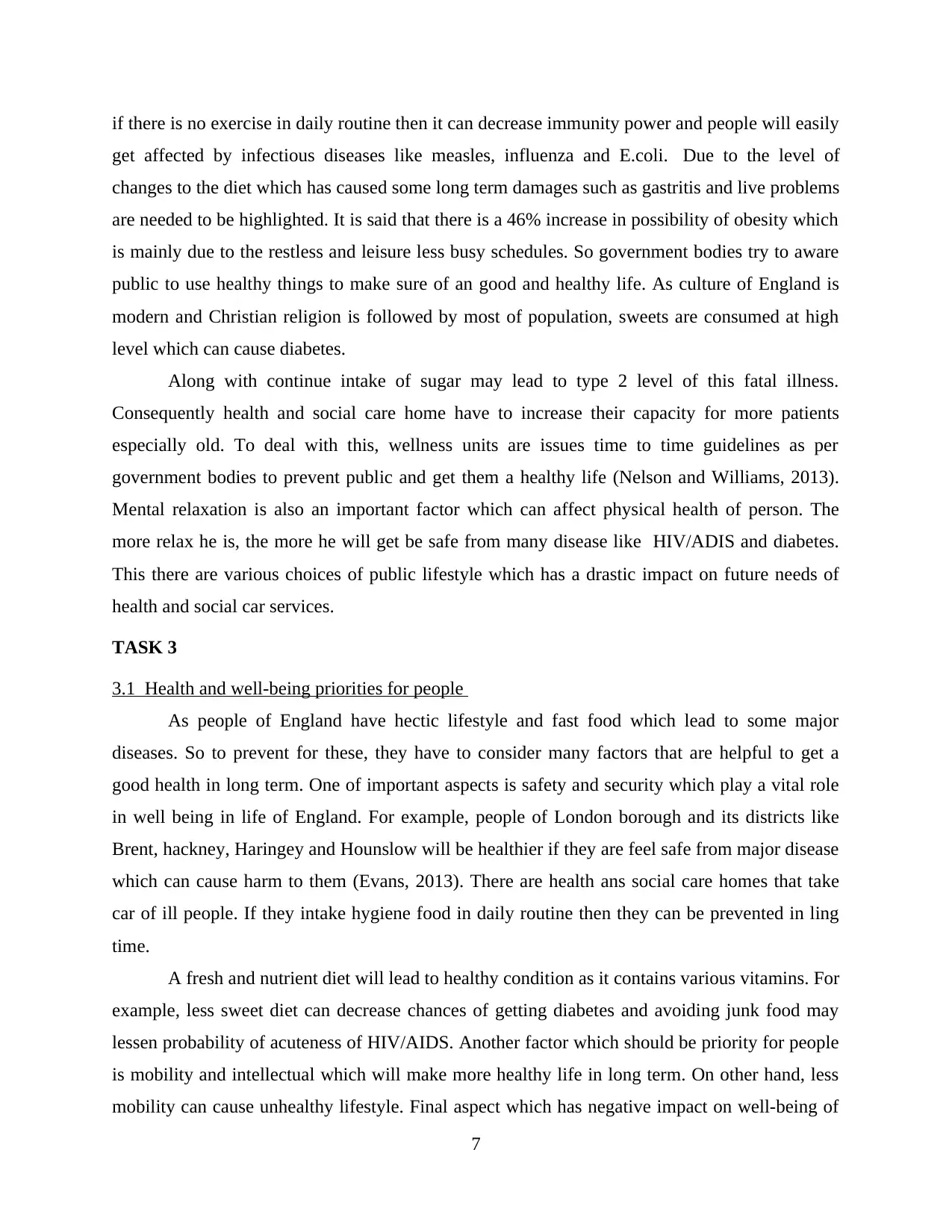
if there is no exercise in daily routine then it can decrease immunity power and people will easily
get affected by infectious diseases like measles, influenza and E.coli. Due to the level of
changes to the diet which has caused some long term damages such as gastritis and live problems
are needed to be highlighted. It is said that there is a 46% increase in possibility of obesity which
is mainly due to the restless and leisure less busy schedules. So government bodies try to aware
public to use healthy things to make sure of an good and healthy life. As culture of England is
modern and Christian religion is followed by most of population, sweets are consumed at high
level which can cause diabetes.
Along with continue intake of sugar may lead to type 2 level of this fatal illness.
Consequently health and social care home have to increase their capacity for more patients
especially old. To deal with this, wellness units are issues time to time guidelines as per
government bodies to prevent public and get them a healthy life (Nelson and Williams, 2013).
Mental relaxation is also an important factor which can affect physical health of person. The
more relax he is, the more he will get be safe from many disease like HIV/ADIS and diabetes.
This there are various choices of public lifestyle which has a drastic impact on future needs of
health and social car services.
TASK 3
3.1 Health and well-being priorities for people
As people of England have hectic lifestyle and fast food which lead to some major
diseases. So to prevent for these, they have to consider many factors that are helpful to get a
good health in long term. One of important aspects is safety and security which play a vital role
in well being in life of England. For example, people of London borough and its districts like
Brent, hackney, Haringey and Hounslow will be healthier if they are feel safe from major disease
which can cause harm to them (Evans, 2013). There are health ans social care homes that take
car of ill people. If they intake hygiene food in daily routine then they can be prevented in ling
time.
A fresh and nutrient diet will lead to healthy condition as it contains various vitamins. For
example, less sweet diet can decrease chances of getting diabetes and avoiding junk food may
lessen probability of acuteness of HIV/AIDS. Another factor which should be priority for people
is mobility and intellectual which will make more healthy life in long term. On other hand, less
mobility can cause unhealthy lifestyle. Final aspect which has negative impact on well-being of
7
get affected by infectious diseases like measles, influenza and E.coli. Due to the level of
changes to the diet which has caused some long term damages such as gastritis and live problems
are needed to be highlighted. It is said that there is a 46% increase in possibility of obesity which
is mainly due to the restless and leisure less busy schedules. So government bodies try to aware
public to use healthy things to make sure of an good and healthy life. As culture of England is
modern and Christian religion is followed by most of population, sweets are consumed at high
level which can cause diabetes.
Along with continue intake of sugar may lead to type 2 level of this fatal illness.
Consequently health and social care home have to increase their capacity for more patients
especially old. To deal with this, wellness units are issues time to time guidelines as per
government bodies to prevent public and get them a healthy life (Nelson and Williams, 2013).
Mental relaxation is also an important factor which can affect physical health of person. The
more relax he is, the more he will get be safe from many disease like HIV/ADIS and diabetes.
This there are various choices of public lifestyle which has a drastic impact on future needs of
health and social car services.
TASK 3
3.1 Health and well-being priorities for people
As people of England have hectic lifestyle and fast food which lead to some major
diseases. So to prevent for these, they have to consider many factors that are helpful to get a
good health in long term. One of important aspects is safety and security which play a vital role
in well being in life of England. For example, people of London borough and its districts like
Brent, hackney, Haringey and Hounslow will be healthier if they are feel safe from major disease
which can cause harm to them (Evans, 2013). There are health ans social care homes that take
car of ill people. If they intake hygiene food in daily routine then they can be prevented in ling
time.
A fresh and nutrient diet will lead to healthy condition as it contains various vitamins. For
example, less sweet diet can decrease chances of getting diabetes and avoiding junk food may
lessen probability of acuteness of HIV/AIDS. Another factor which should be priority for people
is mobility and intellectual which will make more healthy life in long term. On other hand, less
mobility can cause unhealthy lifestyle. Final aspect which has negative impact on well-being of
7
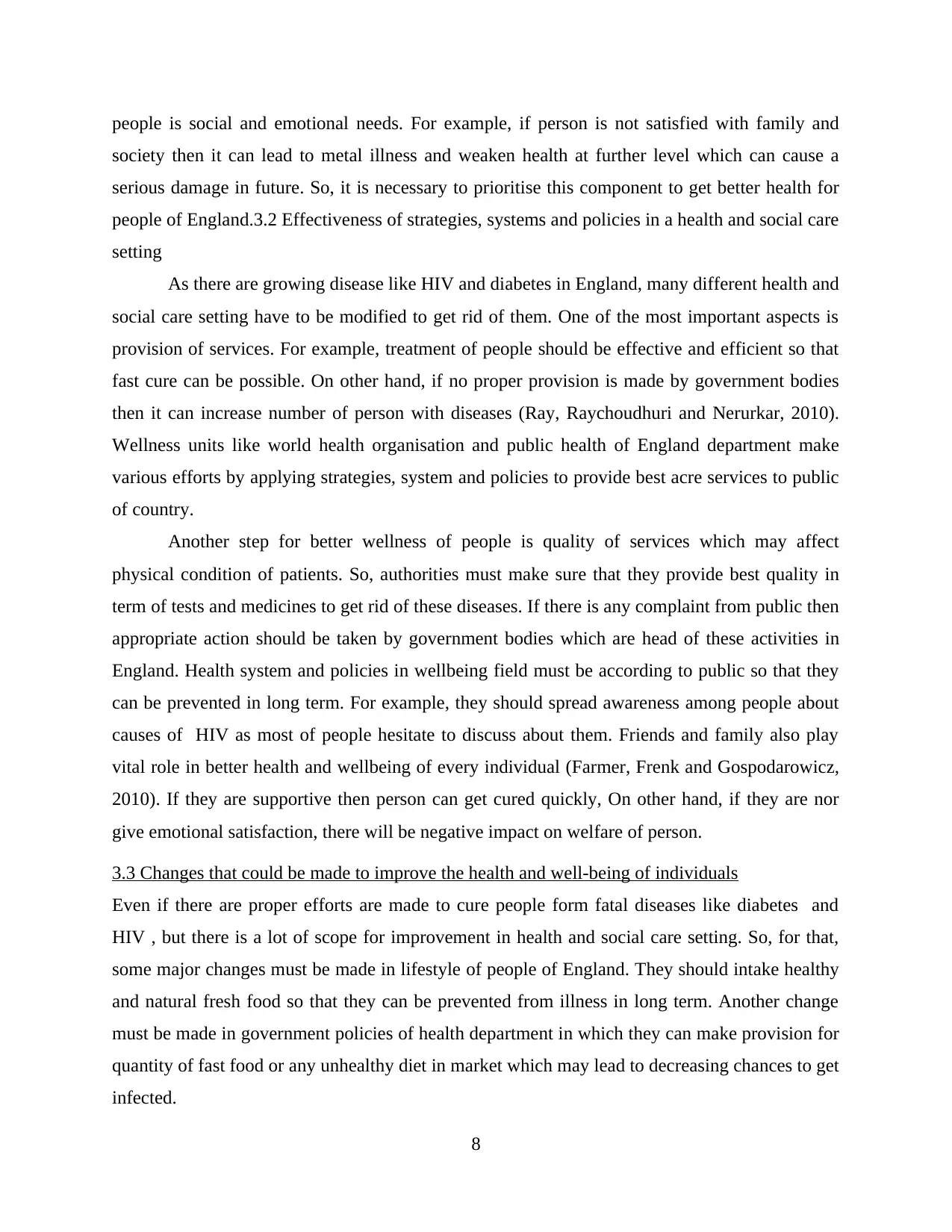
people is social and emotional needs. For example, if person is not satisfied with family and
society then it can lead to metal illness and weaken health at further level which can cause a
serious damage in future. So, it is necessary to prioritise this component to get better health for
people of England.3.2 Effectiveness of strategies, systems and policies in a health and social care
setting
As there are growing disease like HIV and diabetes in England, many different health and
social care setting have to be modified to get rid of them. One of the most important aspects is
provision of services. For example, treatment of people should be effective and efficient so that
fast cure can be possible. On other hand, if no proper provision is made by government bodies
then it can increase number of person with diseases (Ray, Raychoudhuri and Nerurkar, 2010).
Wellness units like world health organisation and public health of England department make
various efforts by applying strategies, system and policies to provide best acre services to public
of country.
Another step for better wellness of people is quality of services which may affect
physical condition of patients. So, authorities must make sure that they provide best quality in
term of tests and medicines to get rid of these diseases. If there is any complaint from public then
appropriate action should be taken by government bodies which are head of these activities in
England. Health system and policies in wellbeing field must be according to public so that they
can be prevented in long term. For example, they should spread awareness among people about
causes of HIV as most of people hesitate to discuss about them. Friends and family also play
vital role in better health and wellbeing of every individual (Farmer, Frenk and Gospodarowicz,
2010). If they are supportive then person can get cured quickly, On other hand, if they are nor
give emotional satisfaction, there will be negative impact on welfare of person.
3.3 Changes that could be made to improve the health and well-being of individuals
Even if there are proper efforts are made to cure people form fatal diseases like diabetes and
HIV , but there is a lot of scope for improvement in health and social care setting. So, for that,
some major changes must be made in lifestyle of people of England. They should intake healthy
and natural fresh food so that they can be prevented from illness in long term. Another change
must be made in government policies of health department in which they can make provision for
quantity of fast food or any unhealthy diet in market which may lead to decreasing chances to get
infected.
8
society then it can lead to metal illness and weaken health at further level which can cause a
serious damage in future. So, it is necessary to prioritise this component to get better health for
people of England.3.2 Effectiveness of strategies, systems and policies in a health and social care
setting
As there are growing disease like HIV and diabetes in England, many different health and
social care setting have to be modified to get rid of them. One of the most important aspects is
provision of services. For example, treatment of people should be effective and efficient so that
fast cure can be possible. On other hand, if no proper provision is made by government bodies
then it can increase number of person with diseases (Ray, Raychoudhuri and Nerurkar, 2010).
Wellness units like world health organisation and public health of England department make
various efforts by applying strategies, system and policies to provide best acre services to public
of country.
Another step for better wellness of people is quality of services which may affect
physical condition of patients. So, authorities must make sure that they provide best quality in
term of tests and medicines to get rid of these diseases. If there is any complaint from public then
appropriate action should be taken by government bodies which are head of these activities in
England. Health system and policies in wellbeing field must be according to public so that they
can be prevented in long term. For example, they should spread awareness among people about
causes of HIV as most of people hesitate to discuss about them. Friends and family also play
vital role in better health and wellbeing of every individual (Farmer, Frenk and Gospodarowicz,
2010). If they are supportive then person can get cured quickly, On other hand, if they are nor
give emotional satisfaction, there will be negative impact on welfare of person.
3.3 Changes that could be made to improve the health and well-being of individuals
Even if there are proper efforts are made to cure people form fatal diseases like diabetes and
HIV , but there is a lot of scope for improvement in health and social care setting. So, for that,
some major changes must be made in lifestyle of people of England. They should intake healthy
and natural fresh food so that they can be prevented from illness in long term. Another change
must be made in government policies of health department in which they can make provision for
quantity of fast food or any unhealthy diet in market which may lead to decreasing chances to get
infected.
8
⊘ This is a preview!⊘
Do you want full access?
Subscribe today to unlock all pages.

Trusted by 1+ million students worldwide
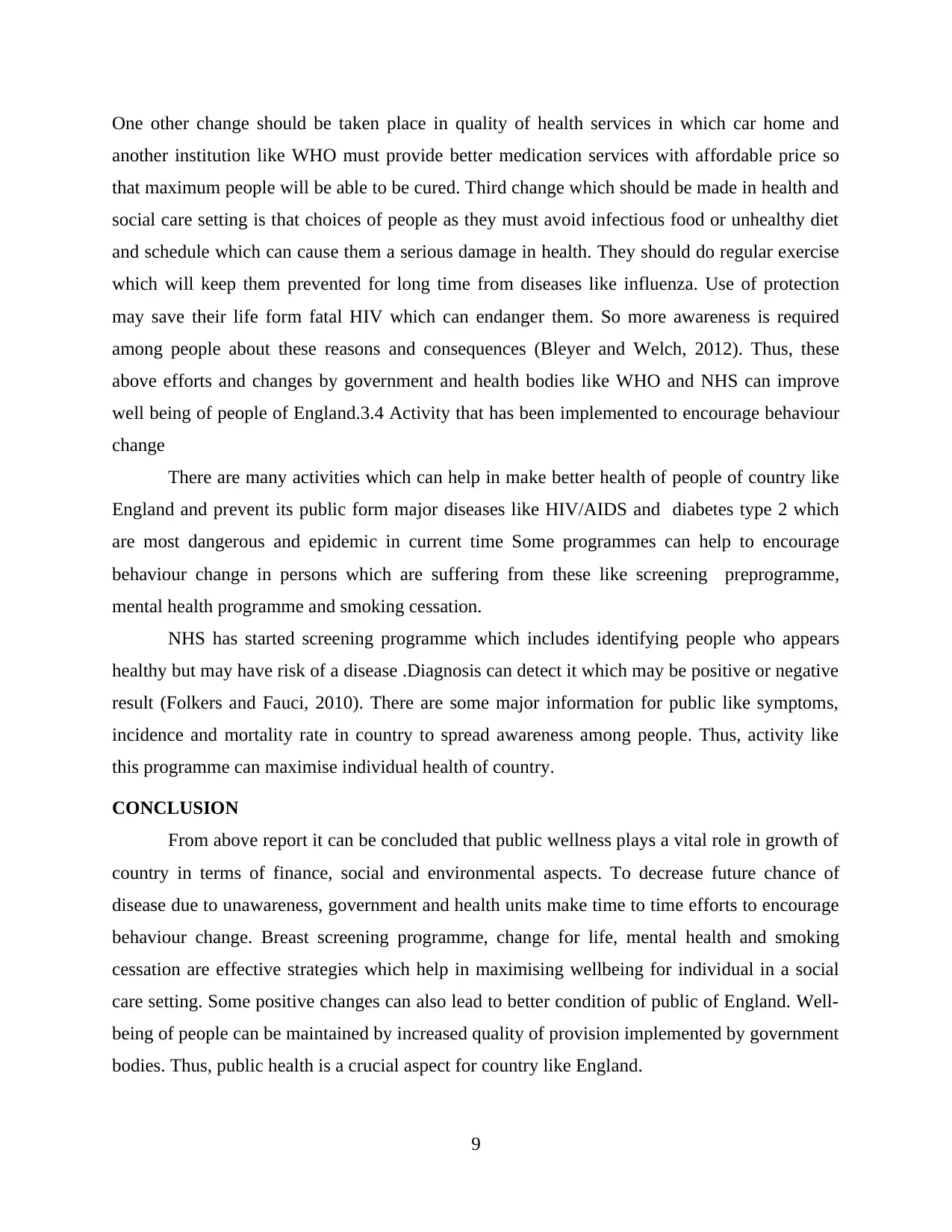
One other change should be taken place in quality of health services in which car home and
another institution like WHO must provide better medication services with affordable price so
that maximum people will be able to be cured. Third change which should be made in health and
social care setting is that choices of people as they must avoid infectious food or unhealthy diet
and schedule which can cause them a serious damage in health. They should do regular exercise
which will keep them prevented for long time from diseases like influenza. Use of protection
may save their life form fatal HIV which can endanger them. So more awareness is required
among people about these reasons and consequences (Bleyer and Welch, 2012). Thus, these
above efforts and changes by government and health bodies like WHO and NHS can improve
well being of people of England.3.4 Activity that has been implemented to encourage behaviour
change
There are many activities which can help in make better health of people of country like
England and prevent its public form major diseases like HIV/AIDS and diabetes type 2 which
are most dangerous and epidemic in current time Some programmes can help to encourage
behaviour change in persons which are suffering from these like screening preprogramme,
mental health programme and smoking cessation.
NHS has started screening programme which includes identifying people who appears
healthy but may have risk of a disease .Diagnosis can detect it which may be positive or negative
result (Folkers and Fauci, 2010). There are some major information for public like symptoms,
incidence and mortality rate in country to spread awareness among people. Thus, activity like
this programme can maximise individual health of country.
CONCLUSION
From above report it can be concluded that public wellness plays a vital role in growth of
country in terms of finance, social and environmental aspects. To decrease future chance of
disease due to unawareness, government and health units make time to time efforts to encourage
behaviour change. Breast screening programme, change for life, mental health and smoking
cessation are effective strategies which help in maximising wellbeing for individual in a social
care setting. Some positive changes can also lead to better condition of public of England. Well-
being of people can be maintained by increased quality of provision implemented by government
bodies. Thus, public health is a crucial aspect for country like England.
9
another institution like WHO must provide better medication services with affordable price so
that maximum people will be able to be cured. Third change which should be made in health and
social care setting is that choices of people as they must avoid infectious food or unhealthy diet
and schedule which can cause them a serious damage in health. They should do regular exercise
which will keep them prevented for long time from diseases like influenza. Use of protection
may save their life form fatal HIV which can endanger them. So more awareness is required
among people about these reasons and consequences (Bleyer and Welch, 2012). Thus, these
above efforts and changes by government and health bodies like WHO and NHS can improve
well being of people of England.3.4 Activity that has been implemented to encourage behaviour
change
There are many activities which can help in make better health of people of country like
England and prevent its public form major diseases like HIV/AIDS and diabetes type 2 which
are most dangerous and epidemic in current time Some programmes can help to encourage
behaviour change in persons which are suffering from these like screening preprogramme,
mental health programme and smoking cessation.
NHS has started screening programme which includes identifying people who appears
healthy but may have risk of a disease .Diagnosis can detect it which may be positive or negative
result (Folkers and Fauci, 2010). There are some major information for public like symptoms,
incidence and mortality rate in country to spread awareness among people. Thus, activity like
this programme can maximise individual health of country.
CONCLUSION
From above report it can be concluded that public wellness plays a vital role in growth of
country in terms of finance, social and environmental aspects. To decrease future chance of
disease due to unawareness, government and health units make time to time efforts to encourage
behaviour change. Breast screening programme, change for life, mental health and smoking
cessation are effective strategies which help in maximising wellbeing for individual in a social
care setting. Some positive changes can also lead to better condition of public of England. Well-
being of people can be maintained by increased quality of provision implemented by government
bodies. Thus, public health is a crucial aspect for country like England.
9
Paraphrase This Document
Need a fresh take? Get an instant paraphrase of this document with our AI Paraphraser
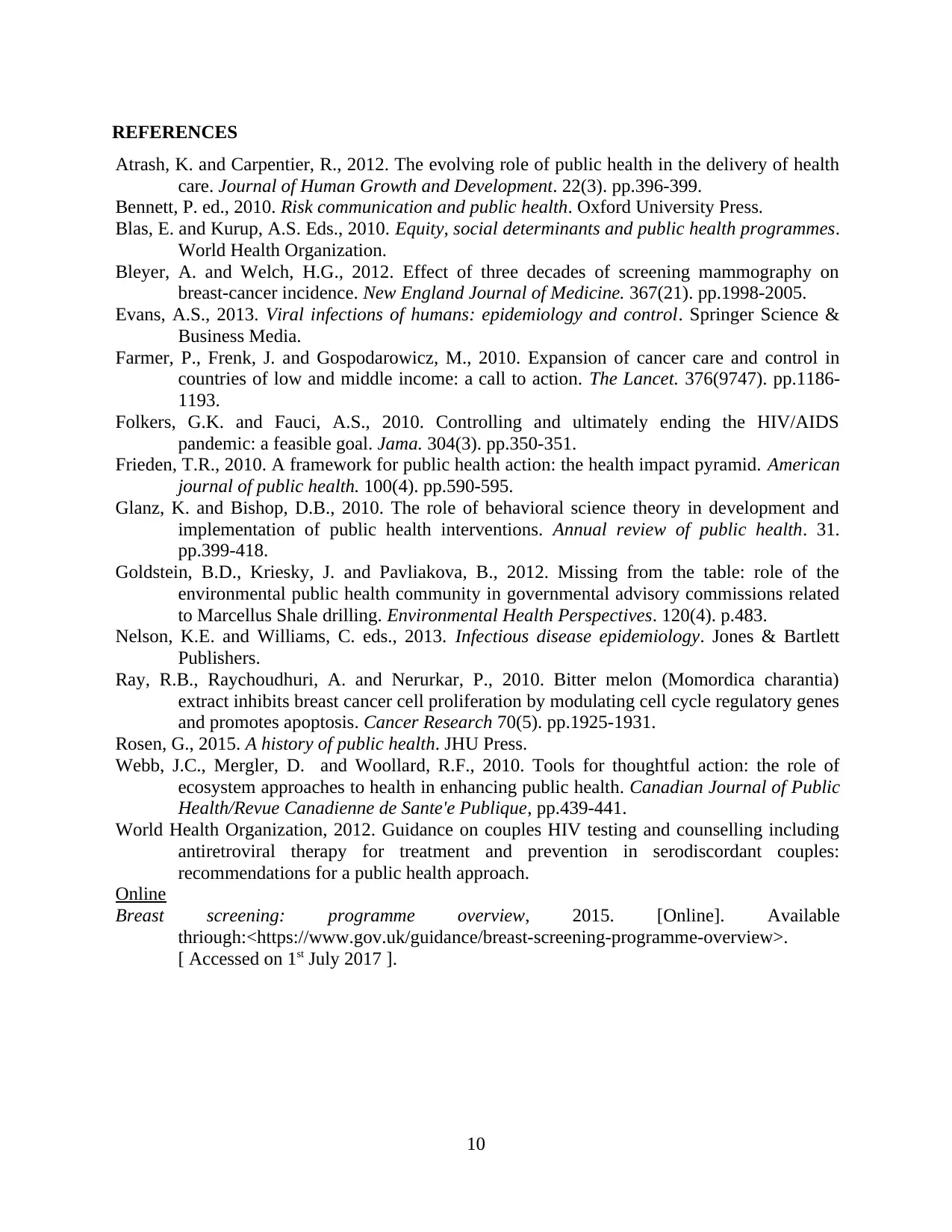
REFERENCES
Atrash, K. and Carpentier, R., 2012. The evolving role of public health in the delivery of health
care. Journal of Human Growth and Development. 22(3). pp.396-399.
Bennett, P. ed., 2010. Risk communication and public health. Oxford University Press.
Blas, E. and Kurup, A.S. Eds., 2010. Equity, social determinants and public health programmes.
World Health Organization.
Bleyer, A. and Welch, H.G., 2012. Effect of three decades of screening mammography on
breast-cancer incidence. New England Journal of Medicine. 367(21). pp.1998-2005.
Evans, A.S., 2013. Viral infections of humans: epidemiology and control. Springer Science &
Business Media.
Farmer, P., Frenk, J. and Gospodarowicz, M., 2010. Expansion of cancer care and control in
countries of low and middle income: a call to action. The Lancet. 376(9747). pp.1186-
1193.
Folkers, G.K. and Fauci, A.S., 2010. Controlling and ultimately ending the HIV/AIDS
pandemic: a feasible goal. Jama. 304(3). pp.350-351.
Frieden, T.R., 2010. A framework for public health action: the health impact pyramid. American
journal of public health. 100(4). pp.590-595.
Glanz, K. and Bishop, D.B., 2010. The role of behavioral science theory in development and
implementation of public health interventions. Annual review of public health. 31.
pp.399-418.
Goldstein, B.D., Kriesky, J. and Pavliakova, B., 2012. Missing from the table: role of the
environmental public health community in governmental advisory commissions related
to Marcellus Shale drilling. Environmental Health Perspectives. 120(4). p.483.
Nelson, K.E. and Williams, C. eds., 2013. Infectious disease epidemiology. Jones & Bartlett
Publishers.
Ray, R.B., Raychoudhuri, A. and Nerurkar, P., 2010. Bitter melon (Momordica charantia)
extract inhibits breast cancer cell proliferation by modulating cell cycle regulatory genes
and promotes apoptosis. Cancer Research 70(5). pp.1925-1931.
Rosen, G., 2015. A history of public health. JHU Press.
Webb, J.C., Mergler, D. and Woollard, R.F., 2010. Tools for thoughtful action: the role of
ecosystem approaches to health in enhancing public health. Canadian Journal of Public
Health/Revue Canadienne de Sante'e Publique, pp.439-441.
World Health Organization, 2012. Guidance on couples HIV testing and counselling including
antiretroviral therapy for treatment and prevention in serodiscordant couples:
recommendations for a public health approach.
Online
Breast screening: programme overview, 2015. [Online]. Available
thriough:<https://www.gov.uk/guidance/breast-screening-programme-overview>.
[ Accessed on 1st July 2017 ].
10
Atrash, K. and Carpentier, R., 2012. The evolving role of public health in the delivery of health
care. Journal of Human Growth and Development. 22(3). pp.396-399.
Bennett, P. ed., 2010. Risk communication and public health. Oxford University Press.
Blas, E. and Kurup, A.S. Eds., 2010. Equity, social determinants and public health programmes.
World Health Organization.
Bleyer, A. and Welch, H.G., 2012. Effect of three decades of screening mammography on
breast-cancer incidence. New England Journal of Medicine. 367(21). pp.1998-2005.
Evans, A.S., 2013. Viral infections of humans: epidemiology and control. Springer Science &
Business Media.
Farmer, P., Frenk, J. and Gospodarowicz, M., 2010. Expansion of cancer care and control in
countries of low and middle income: a call to action. The Lancet. 376(9747). pp.1186-
1193.
Folkers, G.K. and Fauci, A.S., 2010. Controlling and ultimately ending the HIV/AIDS
pandemic: a feasible goal. Jama. 304(3). pp.350-351.
Frieden, T.R., 2010. A framework for public health action: the health impact pyramid. American
journal of public health. 100(4). pp.590-595.
Glanz, K. and Bishop, D.B., 2010. The role of behavioral science theory in development and
implementation of public health interventions. Annual review of public health. 31.
pp.399-418.
Goldstein, B.D., Kriesky, J. and Pavliakova, B., 2012. Missing from the table: role of the
environmental public health community in governmental advisory commissions related
to Marcellus Shale drilling. Environmental Health Perspectives. 120(4). p.483.
Nelson, K.E. and Williams, C. eds., 2013. Infectious disease epidemiology. Jones & Bartlett
Publishers.
Ray, R.B., Raychoudhuri, A. and Nerurkar, P., 2010. Bitter melon (Momordica charantia)
extract inhibits breast cancer cell proliferation by modulating cell cycle regulatory genes
and promotes apoptosis. Cancer Research 70(5). pp.1925-1931.
Rosen, G., 2015. A history of public health. JHU Press.
Webb, J.C., Mergler, D. and Woollard, R.F., 2010. Tools for thoughtful action: the role of
ecosystem approaches to health in enhancing public health. Canadian Journal of Public
Health/Revue Canadienne de Sante'e Publique, pp.439-441.
World Health Organization, 2012. Guidance on couples HIV testing and counselling including
antiretroviral therapy for treatment and prevention in serodiscordant couples:
recommendations for a public health approach.
Online
Breast screening: programme overview, 2015. [Online]. Available
thriough:<https://www.gov.uk/guidance/breast-screening-programme-overview>.
[ Accessed on 1st July 2017 ].
10
1 out of 11
Related Documents
Your All-in-One AI-Powered Toolkit for Academic Success.
+13062052269
info@desklib.com
Available 24*7 on WhatsApp / Email
![[object Object]](/_next/static/media/star-bottom.7253800d.svg)
Unlock your academic potential
Copyright © 2020–2026 A2Z Services. All Rights Reserved. Developed and managed by ZUCOL.





